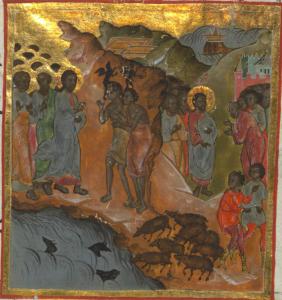
When Jesus encountered two demoniacs, they recognized Jesus and asked him what he was going to do with them:
And when he came to the other side, to the country of the Gadarenes, two demoniacs met him, coming out of the tombs, so fierce that no one could pass that way. And behold, they cried out, “What have you to do with us, O Son of God? Have you come here to torment us before the time?” (Matt. 8:28-29 RSV).
As James indicates (cf. Jas. 2:19), knowledge and belief in God, and therefore knowledge and belief in who Jesus is, is not enough to be saved. One can have demonic knowledge about Christ, knowledge which does not let to the Christian form of life. It is one thing to believe in some element of the truth. It is another to live it out. Belief, in and of itself, is not faith. Faith requires us to put our belief and knowledge into action. To live it out. That is, we can believe many things are true without properly following the ramifications of those truths in our lives. We can know and believe it is illegal to drink and drive, but we might do it anyway; we are not faithful to the law when we do so, and indeed, knowing the law and disobeying it shows how unfaithful we are to it. Faith is demonstrated by fidelity. If we believe in Jesus, we should not perish, but we can if we do not take that belief and put it into action, that is, if we do not follow Jesus and what he expects us to do. Infidelity is impossible without knowledge, for how can one be unfaithful to what one does not know?
In this light, it is possible that we have many kinds of demoniacs side by side with us, people who openly proclaim Jesus and who he is while having nothing to do with him. They speak the truth, but they do not follow the faith. They do not know true love, neither in the form of love which God has for them, nor for the love which they should have for God (and for others out of and in that love for God). If they have anything which can be said to be love, it is a love for themselves. They their ego, which then takes possession of them, and it is that which can be said to be demonic, as it cuts them off from God.
St. John Chrysostom, understanding this, explained that there are many around us, indeed, many who go to churches with us, proclaiming the truth with us, who can be said to be demoniacs, held back from true faith by evil spirits:
For so when any man is dissolute, eager after all embraces, he differs not at all from the demoniac, but goes about naked like him, clad indeed in garments, but deprived of the true covering, and stripped of his proper glory; cutting himself not with stones, but with sins more hurtful than many stones. Who then shall be able to bind such a one? Who, to stay his unseemliness and frenzy, his way of never coming to himself, but forever haunting the tombs? [1]
Among those he mentions as being possessed by such evil spirits are the “covetous”:
And what of the covetous man? Is he not like this? For who will be able ever to bind him? Are there not fears and daily threats, and admonitions, and counsels? Nay, all these bonds he bursts asunder; and if any one come to set him free, he adjures him that he may not be freed, accounting it the greatest torture not to be in torture: than which what can be more wretched? For as to that evil spirit, even though he despised men, yet he yielded to the command of Christ, and quickly sprang out of the man’s body; but this man yields not even to His commandment. See at least how he daily hears Him saying, “You cannot serve God and mammon,” and threatening hell, and the incurable torments, and obeys not: not that He is stronger than Christ, but because against our will Christ corrects us not.[2]
Just because we take on the name of Christian, just because we have been baptized and chrismated, just because we profess with our mouth that Jesus is Lord, does not mean we follow him with the faith and love which we should have. If we do not, then we cut ourselves off from Christ and become possessed, as it were, with evil spirits which encourage us in many ways to reject the law of love. Covetousness leads us to become possessed by the money which we wish to possess. Insofar as we do not reject this spirit, we find ourselves far from Christ. But, it is clear, Jesus can save us, he can help us, if only we will him to do so; no one is purely evil, no one is so possessed by evil that they cannot wish for and receive the grace of God to help them fight that evil and have it expelled from their lives.
The greatness of the faith, the greatness of Christ, is the greatness of love; the possessed turn away from such love, while the faithful will turn to it, let it touch them and transform them, so that they can be set free in Christ. But once they are set free, they must truly turn to Christ, turn to his love, and follow it with their deeds, leaving no room for other evil spirits to come in and take the place of what was cast out (cf. Matt. 12:43-45). They must truly look to God in love, and with that love, look to the world and desire God’s love to be shared with all so that all could be saved. In this way, we should follow the example of Paul as he looked to his people with such hope: “Brethren, my heart’s desire and prayer to God for them is that they may be saved” (Rom. 10:1 RSV). He, who once held to a demonic hatred against Christ, had that demonic spirit cast out; once it was out of him, he replaced it with the love of God. Paul, though he could be fiery in spirit, nonetheless consisted acted out of that love, showing time and time again how he had love for all. Thus, as Paul tells us, true righteousness is not found in mere belief, nor with mere scholarly knowledge, but “belief in the heart.” That is, their being is centered upon Christ, allowing them to faithfully profess their faith, not just with their lips with some demonic recognition of Christ, but with their deeds, so the way of Christ directs the whole of their life:
Moses writes that the man who practices the righteousness which is based on the law shall live by it. But the righteousness based on faith says, Do not say in your heart, “Who will ascend into heaven?” (that is, to bring Christ down) or “Who will descend into the abyss?” (that is, to bring Christ up from the dead). But what does it say? The word is near you, on your lips and in your heart (that is, the word of faith which we preach); because, if you confess with your lips that Jesus is Lord and believe in your heart that God raised him from the dead, you will be saved. For man believes with his heart and so is justified, and he confesses with his lips and so is saved (Rom. 10:5-10 RSV).
Jesus, and with Jesus, the love of God, is near all of us. We do not make him come to us. He is already there. We can recognize him, like the demoniacs, and not live out our lives with the fidelity and love which Jesus desires from us. But we can also turn to him, let him exorcise from us all that is not one with the love of God, and be set free. We can be saved. We can all be saved, because Jesus took on the sin of the world and cast it away; if we detach ourselves from it, if we do not let ourselves be possessed by it, we shall find it cast aside from us and sharing in the divine life which Jesus desires us to experience.
[1] St. John Chrysostom, Homilies on the Gospel of Saint Matthew in NPNF1(10): 193.
[2] St. John Chrysostom, Homilies on the Gospel of Saint Matthew, 193.
Stay in touch! Like A Little Bit of Nothing on Facebook.
If you liked what you read, please consider sharing it with your friends and family!













